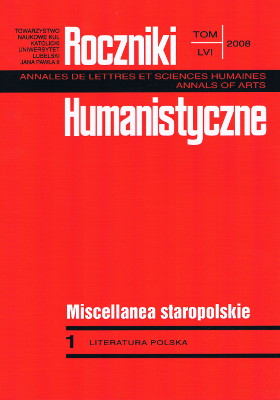Some Remarks on Wespazjan Kochowski’s Epigramaty polskie. A Contribution to the Reception of Albert Ines’s Acroamatum epigrammaticorum centuriae VII in Polish Seventeenth-Century Polish Epigrammatic
Abstract
Albert Ines, the Jesuit new-Latin poet writing in the middle of the seventeenth century, is today almost forgotten. This does not mean that he was not popular among his contemporaries, in particular as an author of epigrams, a fact testified by the number of the editions of his “Acroamatum epigrammaticorum libri VII”, but also by the presence of his works in the collections of poets writing in Polish. He was a source of inspiration for them that equaled Marcialis or John Owen. This paper discusses the question of the reception of Albert Ines’s epigrams in Polish seventeenth-century poetry, as instanced by the paraphrases of the Jesuit poet’s texts in Wespazjan Kochowski’s collection of epigrams put in “Niepróżnujące próżnowanie” [Non-idling Idling]. Moreover, it seeks to present the intertextual dependencies on the basis of some translations made by Kochowski.
Copyright (c) 2008 Roczniki Humanistyczne

This work is licensed under a Creative Commons Attribution-NonCommercial-NoDerivatives 4.0 International License.





